Are You Hurricane Ready? Important Hurricane Tips To Stay Safe Before, During, and After Hurricanes Hit
The Atlantic Hurricane season is in full swing! Check out these important tips that can help you weather the storm—before, during, and after a hurricane strikes.
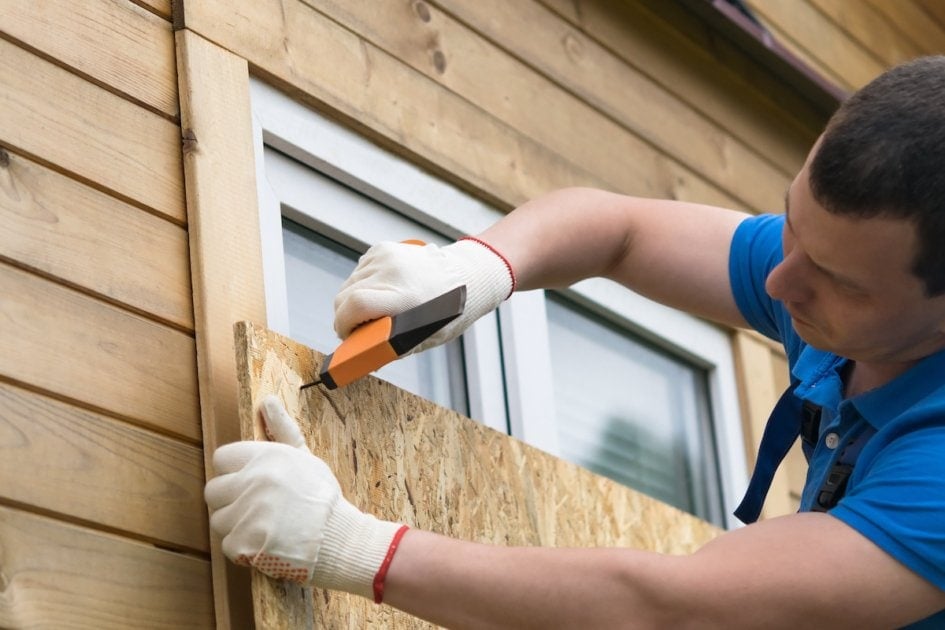
The Atlantic hurricane season starts June 1 and goes through November 30. Hurricanes are one of the weather’s most monstrous storms. What’s more, a hurricane can impact your area for days at a time—all the more reason to be prepared if one is forecast to hit your city. A hurricane’s main threat is storm surge, but heavy rain, flooding, high winds, power outages, and tornadoes are a big concern. Here are some hurricane safety tips that will help you become hurricane ready.
Check out the hurricane names for the season.
Before Hurricane Season
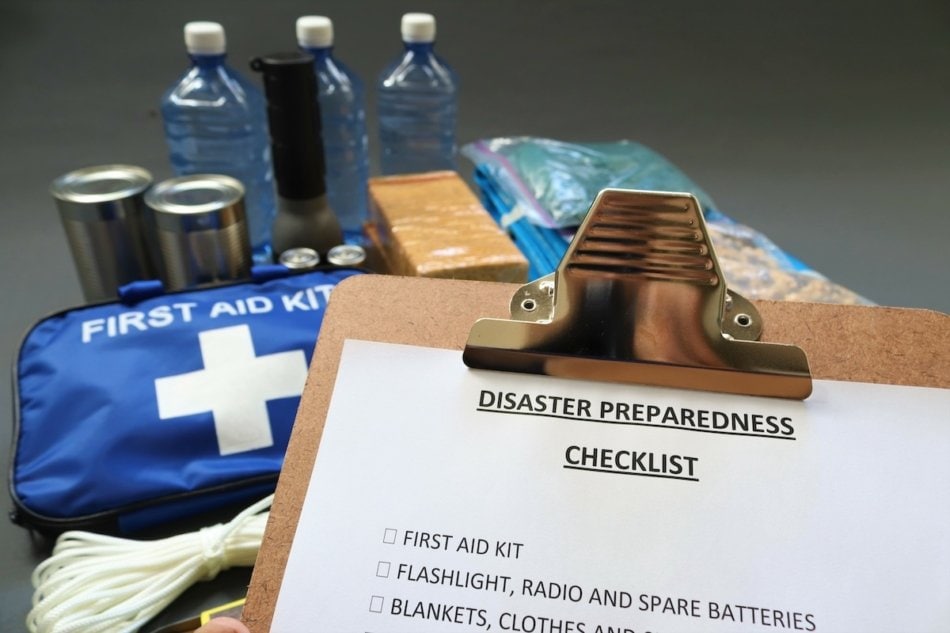
Here in the US, it’s the Atlantic hurricane season that spins up storms that threaten our Atlantic and Gulf coasts. The season starts every June 1st and runs until November 30th, peaking around September 10th. But it’s wise to begin planning for the upcoming season in April or May.
- Assemble an emergency kit. If you already have a kit, refresh any expired items.
Don’t forget to include prescription medications! - Develop or review a family disaster plan.
Identify meet-up locations, how to contact one another, etc. - Find out if you live in a flood zone or an evacuation zone.
This will tell you whether your home and family is at high risk for flooding/flood damage. - Know your city’s evacuation routes and destinations.
You’ll know where to go if local authorities issue an evacuation order. - Make sure your home, vehicle, and flood insurance policies are up-to-date.
- Sign up for emergency mobile or text alerts on your cell phone.
This will help you stay informed of worsening weather.
When A Hurricane Watch Is Issued
A tropical storm or hurricane watch is issued whenever winds of 39 to 73 mph (called “tropical-storm force”) are expected to arrive in the next 48 hours. This is the time to begin making the following storm preparations. If you wait, you may not have time to complete your prep before winds become too strong to go outdoors!
- Stock up on non-perishable food (enough for 3 days).
- Stock up on bottled water (1 gallon per person, per day).
- Withdraw extra cash from the bank or ATM.
If credit/debit card machines go down, you’ll still be able to buy supplies. - Fill your car’s gas tank.
If a mandatory evacuation is ordered, you’ll be road ready. - Place IDs, insurance policies, cash, credit cards, and valuables in a water-proof container.
- Purchase a NOAA weather radio. If you already own one, refresh its batteries.
If electricity and cell phone service is lost, you’ll be able to stay informed of the weather. - Close, lock, and cover windows with storm shutters or plywood.
- Secure lawn and patio furniture, garbage bins, and other loose objects.
This will keep objects from being picked up by high winds and causing additional damage - Bring pets indoors and prepare a pet emergency kit. Move livestock to higher ground, or consider evacuating them altogether.
- Decide if you will evacuate or “shelter in place” (if not ordered to evacuate).
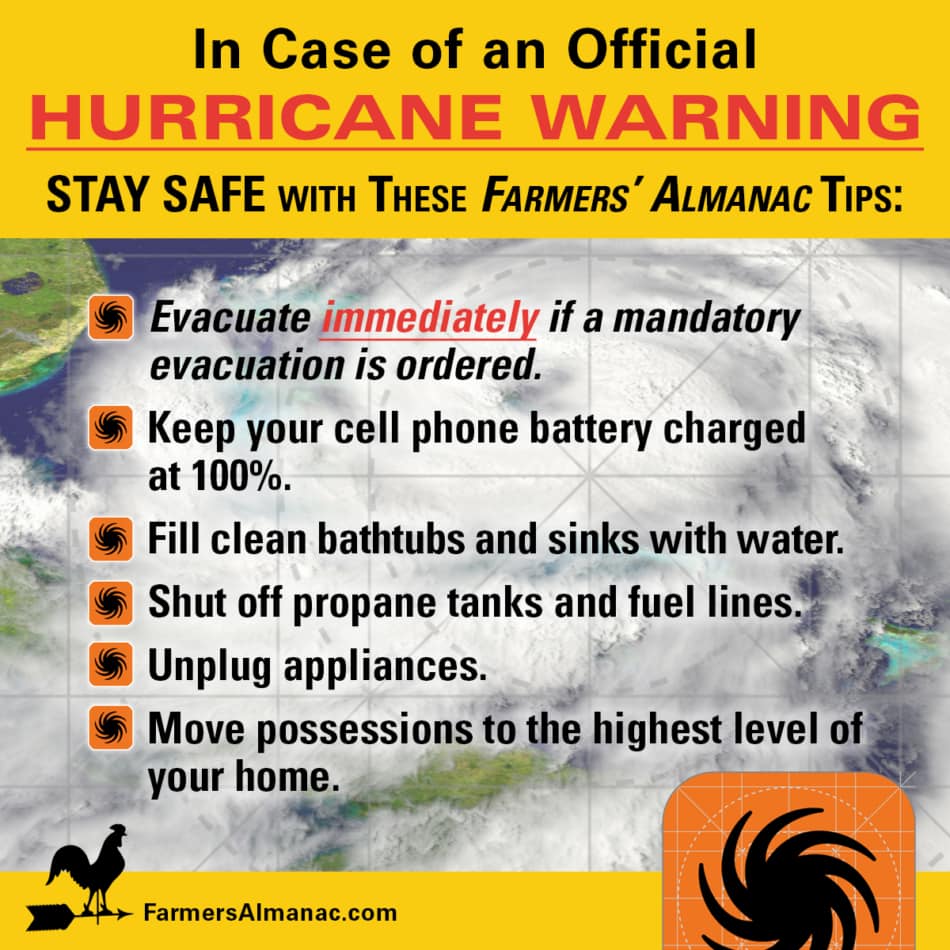
When A Hurricane Warning Is Issued
A tropical storm or hurricane warning is issued 36 hours before winds of 39 to 73 mph are expected to arrive. This is the time to finish completing storm preparations.
- If a mandatory evacuation is ordered, don’t take time to finish preparations — leave immediately! If you live in a trailer or mobile home, ALWAYS evacuate!
- Keep your cell phone battery charged at 100%.
- Fill clean bathtubs and sinks with water.
This water can be used for flushing toilets and other sanitary uses. - Shut off propane tanks and fuel lines.
- Unplug appliances.
This helps prevent gas leaks and power surges. - Move possessions to the highest level of your home.
This helps protect items from flood damage.
Safety Measure During A Hurricane
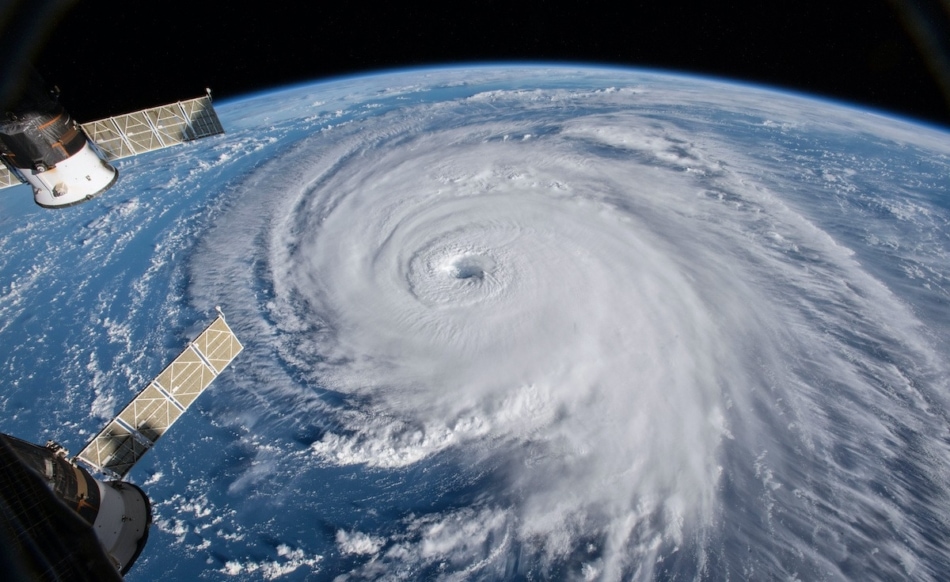
If a mandatory evacuation isn’t ordered and you decide to ride out the storm, take these precautions to remain safe while indoors.
- Move to a small interior, windowless room (such as a closet or bathroom) on the lowest floor.
This puts more walls between you and the winds and flying debris. - Wear shoes or rain boots.
This will help protect your feet when walking through debris and floodwater after the storm. - Use generators in well-ventilated areas.
Using generators indoors or in enclosed spaces can cause carbon monoxide poisoning. - Stay indoors until the storm is over. When the storm’s eye passes over, the weather will temporarily clear — but don’t be fooled!
After A Hurricane
When the storm is finally over, you will still need to keep safe from any damage and flooding that may have occurred.
- If you evacuated, return to your home only when local officials say it is safe to do so.
- Continue to use bottled water until local officials say tap water is safe.
- Avoid contact with floodwater. It may be contaminated with sewage, chemicals, or carry disease-prone insects/animals.
- Don’t walk, swim, or drive into floodwaters.
6 inches of fast-moving water can knock over an adult, and 1-2 feet of water can wash away most vehicles. - Keep away from low-hanging and downed power lines.
- Don’t let your pets go outdoors without a leash.
- If you are unable to make a phone call, send a text message instead.
Texts use less bandwidth than phone calls and may get through busy circuits when a call won’t. - Take pictures of property damage for insurance purposes.
Join the Discussion
Do you have any tips we should add to the list? Share them in the comments below.
Related Articles
Primer on Hurricanes, Tornadoes and Storm Surges
The Hurricane’s Horrible Hands: A Weather Folklore
10 Warm Weather Power Outage Tips

Tiffany Means
Tiffany Means is a freelance writer and a degreed meteorologist. She specializes in weather forecasting and enjoys making the subject of weather (and the science behind it) more relatable. She currently resides in the Blue Ridge Mountains of North Carolina.

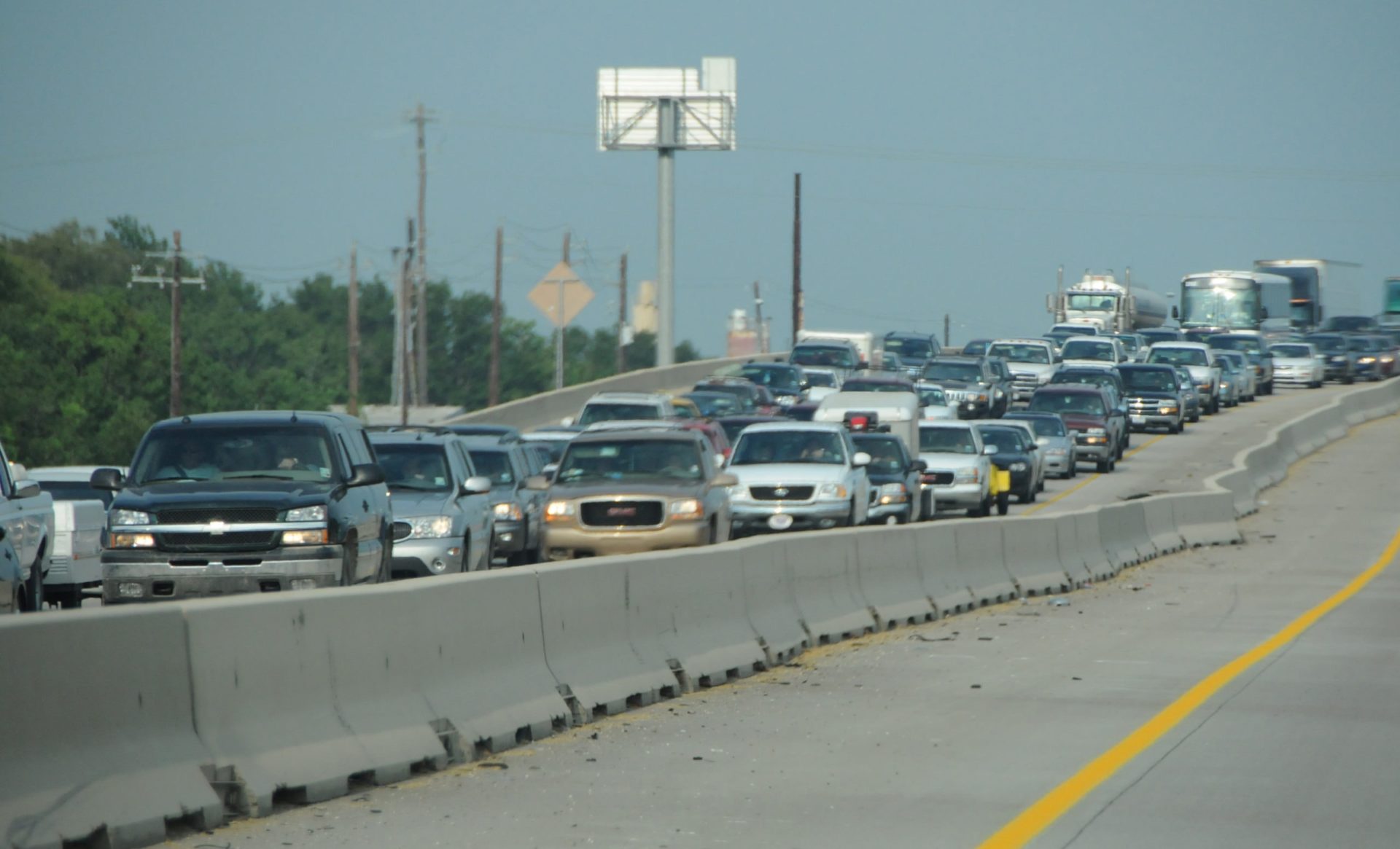
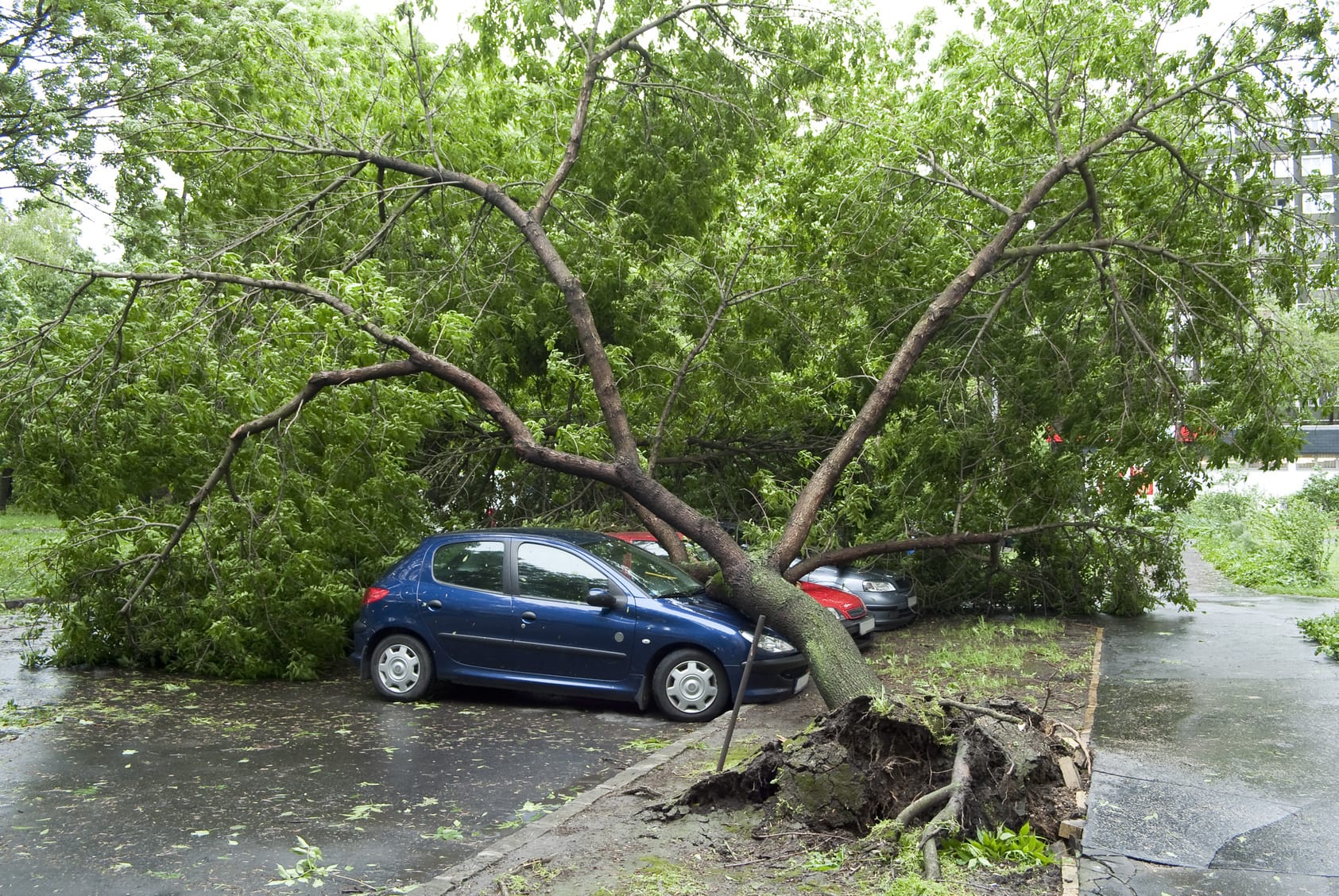





You can fill up outside trash ans with water for flushing.
Please be careful !!! Pay attendance to weather reports !